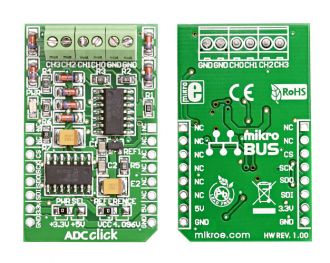
We strongly encourage users to use Package manager for sharing their code on Libstock website, because it boosts your efficiency and leaves the end user with no room for error. [more info]

Rating:
Author: MIKROE
Last Updated: 2019-03-22
Package Version: 1.0.0.1
mikroSDK Library: 1.0.0.0
Category: ADC
Downloaded: 16917 times
Followed by: 2 users
License: MIT license
Simple example which demonstrates working with the 4-Channel 12-bit A/D Converter (MCP3204) with SPI Serial Interface. The example shows how to measure analog inputs on Channels 0, 1, 2 and 3 and display the results on LCD.
Do you want to subscribe in order to receive notifications regarding "ADC click" changes.
Do you want to unsubscribe in order to stop receiving notifications regarding "ADC click" changes.
Do you want to report abuse regarding "ADC click".

Front and back view of ADC click board designed in mikroBUS form factor. mikroBUS is specially designed pinout standard with SPI, I2C, Analog, UART, Interrupt, PWM, Reset and Power supply pins.
View full imageLibrary Description
The library covers all the necessary functions that enables the usage of the ADC click board.
It initializes and defines the SPI driver and drivers that offer a choice for reading digital
data from all four channels seperatly or all together.
Key functions:
uint16_t adc_getAdcCh0();- Function reads data from 0th channel.Examples Description
The application is composed of three sections:
void applicationTask()
{
adc_getAdcAllChan( &valChan0, &valChan1, &valChan2, &valChan3 );
Delay_ms( 100 );
WordToStr( valChan0, txt );
Ltrim( txt );
mikrobus_logWrite( " Channel 0 : ", _LOG_TEXT );
mikrobus_logWrite( txt, _LOG_LINE );
WordToStr( valChan1, txt );
Ltrim( txt );
mikrobus_logWrite( " Channel 1 : ", _LOG_TEXT );
mikrobus_logWrite( txt, _LOG_LINE );
WordToStr( valChan2, txt );
Ltrim( txt );
mikrobus_logWrite( " Channel 2 : ", _LOG_TEXT );
mikrobus_logWrite( txt, _LOG_LINE );
WordToStr( valChan3, txt );
Ltrim( txt );
mikrobus_logWrite( " Channel 3 : ", _LOG_TEXT );
mikrobus_logWrite( txt, _LOG_LINE );
mikrobus_logWrite( "------------------", _LOG_LINE );
Delay_ms( 1000 );
}
Other mikroE Libraries used in the example:
Additional notes and informations
Depending on the development board you are using, you may need USB UART click, USB UART 2 click or RS232 click to connect to your PC, for development systems with no UART to USB interface available on the board. The terminal available in all MikroElektronika compilers, or any other terminal application of your choice, can be used to read the message